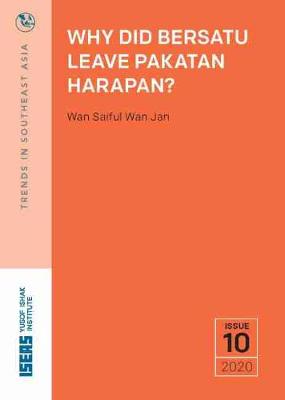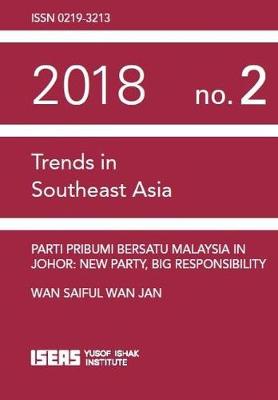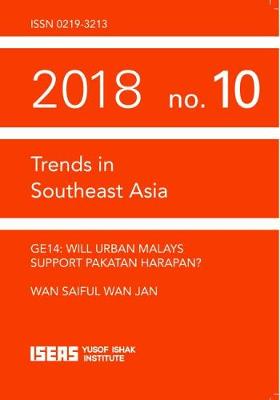Trends in Southeast Asia
4 total works
The Pakatan Harapan (PH) coalition won Malaysia's 14th general election on 9 May 2018, the first time a regime change took place in the country. However, it lost its majority in late February 2020, when Parti Pribumi Bersatu Malaysia (BERSATU) left the coalition.
The four parties in PH had very different ideologies, especially when it comes to issues of race and religion. But despite taking various steps to create a coalition agreement, the more fundamental differences were never reconciled during the coalition's time in power.
PH won GE-14 with a relatively low level of support from the ethnic Malays, who perceived it to be a coalition dominated by the mainly Chinese DAP. Fearmongering about how PH and the DAP were a threat to Malay privileges further weakened PH while in government.
Furthermore, BERSATU disliked the possibility that Parti Keadilan Rakyat (KEADILAN) president Anwar Ibrahim might succeed Mahathir Mohamad as prime minister. They did not trust Anwar to champion the Malay agenda if he became prime minister.
BERSATU decided as early as in 2019 to explore leaving PH to form a new Malay-led government, and saw the departure as a necessary step for a better chance at winning GE15.
This was a controversial decision and it created a major rift within BERSATU itself, with party chairman and then Prime Minister Mahathir Mohamad refusing to accept the party's decision to leave PH.
Following Mahathir's sudden resignation on 24 February 2020, BERSATU immediately announced their departure from PH. This led to a series of events that culminated in the collapse of PH and the formation a Perikatan Nasional government led by the three biggest Malay parties, UMNO, BERSATU and PAS.
The whole episode shows that any coalition or political parties that wish to govern Malaysia must not ignore sentiments among the Malays, especially those in rural areas.
The four parties in PH had very different ideologies, especially when it comes to issues of race and religion. But despite taking various steps to create a coalition agreement, the more fundamental differences were never reconciled during the coalition's time in power.
PH won GE-14 with a relatively low level of support from the ethnic Malays, who perceived it to be a coalition dominated by the mainly Chinese DAP. Fearmongering about how PH and the DAP were a threat to Malay privileges further weakened PH while in government.
Furthermore, BERSATU disliked the possibility that Parti Keadilan Rakyat (KEADILAN) president Anwar Ibrahim might succeed Mahathir Mohamad as prime minister. They did not trust Anwar to champion the Malay agenda if he became prime minister.
BERSATU decided as early as in 2019 to explore leaving PH to form a new Malay-led government, and saw the departure as a necessary step for a better chance at winning GE15.
This was a controversial decision and it created a major rift within BERSATU itself, with party chairman and then Prime Minister Mahathir Mohamad refusing to accept the party's decision to leave PH.
Following Mahathir's sudden resignation on 24 February 2020, BERSATU immediately announced their departure from PH. This led to a series of events that culminated in the collapse of PH and the formation a Perikatan Nasional government led by the three biggest Malay parties, UMNO, BERSATU and PAS.
The whole episode shows that any coalition or political parties that wish to govern Malaysia must not ignore sentiments among the Malays, especially those in rural areas.
Parti Pribumi Bersatu Malaysia (PPBM) was officially launched on 14 January 2017, led by prominent personalities including former Prime Minister Mahathir Mohamad, former Deputy Prime Minister Muhyiddin Yassin, and former Kedah Chief Minister Mukhriz Mahathir.
Upon establishment, the party immediately announced that they are aiming to win the southern state of Johor in the upcoming general election. Historically, UMNO splinter parties have never been able to threaten UMNO in this state. Since independence, Johor has always been seen as an UMNO bastion.
PPBM has moved quickly to establish themselves in all parliamentary and state constituencies in Johor, however, and it has been rather successful in attracting support from those aged below 35. Their key challenge remains the rural and female voters.
Identity politics is a major hurdle for PPBM. The presence of the Democratic Action Party (DAP) in the Pakatan Harapan coalition - of which PPBM is a member - is a hurdle in attracting Malay support. Among Malay voters, DAP is perceived as a threat to Malay privileges.
At the same time, PPBM leaders in Johor believe that their contribution towards the coalition is not yet fully recognized by their coalition partners who insist that PPBM contests only in constituencies with a large Malay population. Areas with a high percentage of Malay voters are difficult for PPBM to win because UMNO tends to enjoy huge support in such constituencies, and PPBM leaders argue that they deserve more mixed seats to run in as well.
Winning Johor, or some other state, is crucial for PPBM. Should the coalition fail to win at the federal level, PPBM will need a base to avoid disintegration.
Upon establishment, the party immediately announced that they are aiming to win the southern state of Johor in the upcoming general election. Historically, UMNO splinter parties have never been able to threaten UMNO in this state. Since independence, Johor has always been seen as an UMNO bastion.
PPBM has moved quickly to establish themselves in all parliamentary and state constituencies in Johor, however, and it has been rather successful in attracting support from those aged below 35. Their key challenge remains the rural and female voters.
Identity politics is a major hurdle for PPBM. The presence of the Democratic Action Party (DAP) in the Pakatan Harapan coalition - of which PPBM is a member - is a hurdle in attracting Malay support. Among Malay voters, DAP is perceived as a threat to Malay privileges.
At the same time, PPBM leaders in Johor believe that their contribution towards the coalition is not yet fully recognized by their coalition partners who insist that PPBM contests only in constituencies with a large Malay population. Areas with a high percentage of Malay voters are difficult for PPBM to win because UMNO tends to enjoy huge support in such constituencies, and PPBM leaders argue that they deserve more mixed seats to run in as well.
Winning Johor, or some other state, is crucial for PPBM. Should the coalition fail to win at the federal level, PPBM will need a base to avoid disintegration.
In Malaysia’s last general election, urban voters tended to support the opposition coalition — 72 of the 97 urban parliamentary seats were in fact won by it. However, most of these seats have a mixed demography, with a high percentage of ethnic Chinese voters.
In the upcoming general election, Pakatan has a good chance of winning the federal government if Malay voters join their Chinese counterparts in supporting the opposition coalition. A subsequent so-called “Malay tsunami” could lead to a Pakatan victory.
This present study, which is based on a series of focus group discussions held in the Malaysian states of Kedah and Johor, finds that urban Malay voters are very unhappy with the economic condition of the country and are also worried about corruption.
But despite their grouses, they are still uncertain about supporting the opposition coalition due to the fear of losing the race-based privileges they enjoy as ethnic Malays.
In the upcoming general election, Pakatan has a good chance of winning the federal government if Malay voters join their Chinese counterparts in supporting the opposition coalition. A subsequent so-called “Malay tsunami” could lead to a Pakatan victory.
This present study, which is based on a series of focus group discussions held in the Malaysian states of Kedah and Johor, finds that urban Malay voters are very unhappy with the economic condition of the country and are also worried about corruption.
But despite their grouses, they are still uncertain about supporting the opposition coalition due to the fear of losing the race-based privileges they enjoy as ethnic Malays.



